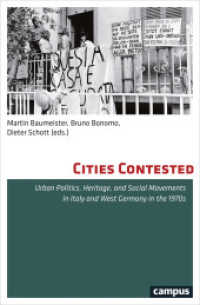- ホーム
- > 洋書
- > 英文書
- > Business / Economics
Full Description
This book contains an Open Access chapter.
Discover the transformative power of 'coopetition' in the dynamic world of tourism and hospitality organisations, where inclusive development takes centre stage. The traditional model of competing alone is losing ground, making way for a new era of collaboration and partnership-driven competition. It is within this context that participating in a network becomes vital for organisations seeking a competitive advantage.
Drawing on the work of a range of global contributors, the editors examine how this dyadic behaviour of simultaneously cooperating and competing among two or more players is transforming the tourism sector. Through meticulous planning and strategic implementation, 'coopetition' can generate remarkable advantages for tourism destinations and their stakeholders. Each chapter provides a real case of coopetition in the tourism sector and offers tools and ways to manage strategic networks under intentional coopetition.
Value Proposition for Tourism Coopetition offers a wealth of insights and tools for stakeholders within the tourism industry, including operational takeaways and actionable strategies that will empower you to harness the full potential of coopetition in the tourism and hospitality sectors. Unlock the key to fostering sustainable growth, innovation, and collaborative success in an increasingly interconnected world.
Contents
Chapter 1. Introduction - The value proposition to tourism: The coopetition era; Adriana Fumi Chim-Miki and Rui Augusto da Costa
Part One. Co-boost the tourism destination: Public policies to foster coopetition networks
Chapter 2. A Roadmap to build Tourism Coopetition: One way to coopetitiveness; Adriana Fumi Chim-Miki and Rui Augusto da Costa
Chapter 3. Cross-border tourism coopetition among European countries: Insights from the travel and tourism development index; Petra Vašaničová
Chapter 4. A Taxonomy of value creation and appropriation from tourism coopetition; Jako Volschenk, Wojciech Czakon, Adriana Fumi Chim-Miki, and Rui Augusto da Costa
Chapter 5. Coopetition strategy in the context of multilevel governance: Evidence from UNESCO's global creative cities policy; Magnus Emmendoerfer and Elias Mediotte
Chapter 6. Coopetitive action of small-scale accommodations; Maya Damayanti, Mohd Alif Mohd Puzi, Sari Lenggogeni and Hairul Nizam Ismail
Part Two. Co-create tourism business and products: Co-entrepreneurs using coopetition strategies
Chapter 7. Co-location and coopetition as the sources of slow (city) tourism: Case Rovaniemi; Anna-Emilia Haapakoski, Juulia Tikkanen, and Rauno Rusko
Chapter 8. Leveraging co-entrepreneurship through coopetition: The role of governance mechanisms in tourism destinations; Joice Denise Schäfer and Rogério João Lunkes
Chapter 9. Coopetition Local Index (i-COOL): A tool to measure coopetition level at tourism destinations; Adriana Fumi Chim-Miki and Rosa M Batista-Canino
Part Three. Co-consolidate the tourism destination: Endogenous resources and the Coopetition behaviour at the host society
Chapter 10. The coopetition model in the tourism sector: The proliferation of reusable cup-sharing schemes; Nadine Leder, Maria Saju Abraham, and Jin Hooi Chan
Chapter 11. Analysing coopetition in the wine business ecosystem: A literature review; Marcia Mariluz Amaral, Luiz Carlos Da Silva Flores, and Sara Joana Gadotti Dos Anjos
Chapter 12. Exploring barriers arising from coopetition: A case study in the Brazilian wine tourism industry; Jefferson Marlon Monticelli, Tatiane Pellin Cislaghi, and Kettrin Farias Bem Maracajá
Chapter 13. Enhancing business strategies in tourism through coopetition: An essay; Sofia Almeida and João Domingues
Part Four. Co-promote the tourism sector: Including the visitors in the coopetition process to co-produce the destination
Chapter 14. The impact of the local residents' voice and social media brand engagement on coopetition in tourism destinations: The mediating role of knowledge sharing; Elahe Hosseini, Milad Ebrahimi, and Aidin Salamzadeh
Chapter 15. Co-creating locally embedded rural tourist experiences using coopetition strategies - Insights from village tourism in Portugal; Elisabeth Kastenholz and Mariana Carvalho
Chapter 16. Social relationships in coopetition among entrepreneurs on culinary tourist routes; Katarzyna Czernek-Marszałek and Dagmara Wójcik OPEN ACCESS
Chapter 17. Fostering a Better Spatial Distribution of Tourism: Using Geotagged Photos to Shape the Coopetition Network; Marcio Martins, Rui Augusto da Costa, and André Pedrosa
Chapter 18. Conclusion: The footprint of coopetition in tourism; Rui Augusto da Costa and Adriana Fumi Chim-Miki








